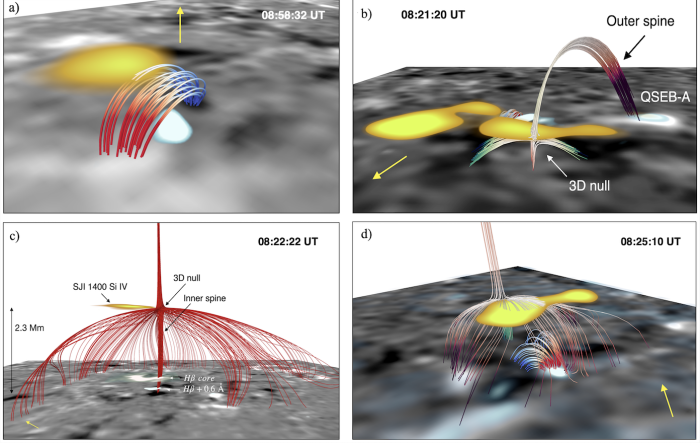Magnetic topology of quiet-Sun Ellerman bombs and associated ultraviolet brightenings
| Nugget | |
|---|---|
| Number: | 485 |
| 1st Author: | Aditi BHATNAGAR |
| 2nd Author: | |
| Published: | 6 January 2025 |
| Next Nugget: | A different kind of messenger |
| Previous Nugget: | Unveiling CME Dynamics: Rare Rotations of CMEs in the Heliosphere |
Introduction
Ellerman "bombs" are small-scale magnetic reconnection events in the lower solar atmosphere. These were first observed in active regions, but now we also detect them in the quiet Sun as well (QSEBs). Recent work (Ref. [1]) has shown that a small percentage of them can occur co-spatially and co-temporally with ultraviolet (UV) brightenings in the transition region. In the quiet Sun, the UV brightenings are less intense than those in active regions.
Results
In our recent work we highlight four different magnetic topologies that can be associated with QSEBs and their related UV brightenings. The magnetic field topology was determined through potential field extrapolations performed on the line-of-sight component of the magnetic field (BLOS) derived from Fe I 6173 Å. We also used the Hα data from the Swedish Solar Telescope SST) to identify QSEBs, while UV brightenings were detected using co-aligned Si IV 1400 Å slit-jaw images from the Interface Region Imaging Spectrograph (IRIS). The four different topologies are illustrated in the schematic in Figure 1. The first topology involves a simple dipole configuration, where the QSEBs occur at polarity inversion lines (PILs) between opposite magnetic polarities. In this case, magnetic flux cancellation at the PIL would drive the energy release. The other three topologies feature a fan-spine configuration with a 3D magnetic null point, where UV brightenings are located near the null point. In these configurations, QSEBs could be observed at three locations, namely near the footpoints of the outer spine, inner spine, or the fan surface. In such cases, the QSEBs could be occurring due to the energy flow from the reconnection site. All these cases suggest that QSEBs and UV brightenings occur due to common reconnection scenarios.

For each of these cases, we show the observations along with their extrapolated field lines in Figure 2, which also highlights the location of the QSEBs and the UV brightenings. The heights of the 3D null points varied significantly, ranging from 0.2 Mm to 2.6 Mm above the solar photosphere which is governed by the magnetic field strength at the footpoints.

Conclusion
The details of this work are available in Ref. [1]. Through this work we show that QSEBs can occur as part of complex magnetic topologies involving 3D nulls with fan-spine structures. These configurations also explain the observed co-spatial and co-temporal relationship between QSEBs and UV brightenings, providing valuable insights into the underlying reconnection-driven processes in the quiet Sun.
References
[1] "Magnetic topology of quiet-Sun Ellerman bombs and associated ultraviolet brightenings"